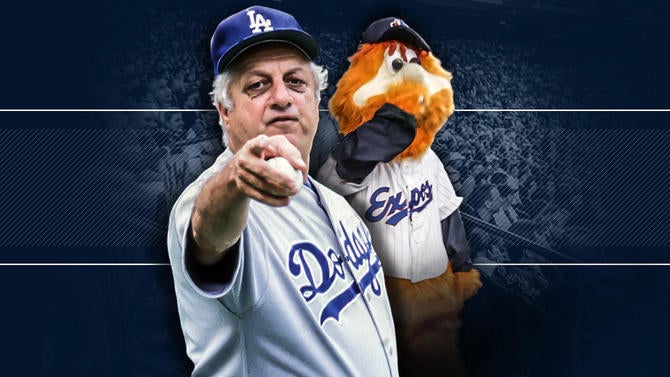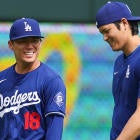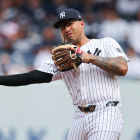It all started innocently enough.
The instigator danced. Led the crowd in cheers. Razzed the opposition. Harmless stuff, the kind you'd see every time you saw him in person, every time you watched on TV.
If you were on the other side, it was never a big deal. Mostly, you ignored his antics. A particularly clever bit might trigger a little smile, maybe a few chuckles. If you had a good sense of humor -- if you didn't take yourself too seriously -- you might even join in, playing the role of villain with a wink, giving the crowd a chance to laugh at your expense.
Tommy Lasorda had no interest in playing along. He had no interest in being in on the joke. On this date 28 years ago, Lasorda did something you probably won't ever see at a ballgame, in your entire life. He got a mascot ejected.
The story of how the former Los Angeles Dodgers manager orchestrated that furry fling is a wild one. It features a defunct franchise, a game that remained scoreless for 21 innings, an #umpshow to end all #umpshows, a night of hacking unmatched in baseball history, and a series of bad breaks that drove a future Hall of Famer mad. So pull up a chair, and join us for the story of one of the craziest games of all time -- The Night Youppi! Got Tossed.

Anyone with tickets to the Aug. 23, 1989 matchup between the Dodgers and the Montreal Expos could have predicted a low-scoring affair with a high degree of certainty.
The Expos had spent 49 days in first place that season, before falling into a slump that knocked them into a tie for second. They'd averaged fewer than three runs per game over their previous 25 contests, and would go on to tie for the sixth-fewest runs scored by any team in the majors that season. Those were downright gaudy numbers compared to L.A.'s offense. The defending World Series champs had thrived with a devastating pitching staff and subpar hitters a year earlier. In '89 they couldn't hit a lick, going on to finish dead last in MLB in runs scored, 30 runs worse than the second-most punchless team.
That night's starting pitchers added to expectations of a pitchers' duel. On the mound for the Expos was Pascual Perez, the wildly entertaining string bean who was also one of the best redemption stories in baseball, having kicked a cocaine habit and emerged as a very good right-hander for Montreal. In Orel Hershiser, the Dodgers had the defending Cy Young winner, a pitcher so dominating he'd broken the all-time scoreless innings streak a year earlier, and who in 1989 would finish just an eyelash off his sparkling ERA from that historic '88 campaign (2.31 vs. 2.26).
Still, when 21,742 fans took their seats for this Wednesday night tilt at Olympic Stadium, none of them could have predicted exactly how much weirdness would come to pass.

"You thought something was going to happen," said Tom Foley, the Expos second baseman that night in '89, now the Tampa Bay Rays bench coach. "You never thought it would go that long."
Very little happened for the first few innings, other than Pascual Perez putting on the greatest show on Earth. Better pitchers overshadowed him, and toiling on some mediocre Expos teams obscured him. But no pitcher was more fun to watch.
Perez was a 162-pound bundle of energy, a non-stop showman, and the owner of the best Jheri curl of his generation. You know how today's pitchers get agitated every time a hitter takes 0.001 seconds too long to round the bases after a home run? It's a wonder Perez didn't get ambushed by mobs of angry opponents after every game. In any given start, you might see him point finger-guns at strikeout victims, look between his legs to coax a runner back to first, spike the ball after successfully covering first, and race off the mound at inning's end like an Olympic sprinter.
Thanks to prolific YouTuber Expos Classics, you can watch the entirety of this Dodgers-Expos game from 28 years ago, a 22-inning game that produced a video lasting an impossible six hours, 39 minutes, and 12 seconds ... most of it in French. You can also watch Perez hurl eight scoreless innings, and pick your favorite Pascual moment. His strikeout of Lenny Harris to end the first, starting at the 12:30 mark, is a great jumping-off point.
As much as Perez tended to steal the spotlight when he pitched, others in attendance that night still call Aug. 23, 1989 The Eddie Murray Game.
As the game wore on, the Dodgers first baseman and future Hall of Famer kept getting more and more frustrated. Murray led off the second inning with a single, then watched helplessly as Mickey Hatcher struck out on three pitches, on a pitch a foot outside. Mike Scioscia then worked a 2-1 count, tapping a bouncer to Expos first baseman Andres Galarraga. The Big Cat fired to second, with the throw beating Murray by a mile.
But Expos shortstop Spike Owen only half-heartedly applied the tag, and Murray appeared to deke Owen to get in safely. Second-base umpire Mark Hirschbeck called him out anyway. Murray was steamed. He kept arguing the play before eventually, grudgingly, trudging off the field.
"I was doing the game with Ken Singleton, he and Eddie are great friends," said long-time Expos play-by-play man Dave Van Horne, now the radio voice of the Miami Marlins. "Kenny was in stitches all night. He spent the whole game laughing at Eddie. Anything that could have happened negatively to Eddie Murray that night, happened."
Murray's second-inning outburst was mild compared to what was to come. He would get angrier and angrier as the game continued, with the biggest injustices yet to come. The best part was this: Murray's tirades would soon collide with Youppi!'s chicanery to produce some of the highest comedy you'll ever see at a ballgame.
In 1978, the Expos introduced a creepy, space-aged version of Mr. Met, a monstrosity named Souki. Mercifully, Souki lasted just that one season.
Looking for a cuddlier, googlier replacement, the team turned to Bonnie Erickson, a skilled artist who'd worked with Muppets creator Jim Henson. She brought Youppi! to life. A man named Jean-Claude Tremblay inhabited the suit in Youppi!'s infancy, eventually leaving to start a mascot-creating company of his own. The man who replaced Tremblay was a local police officer named Pierre Belisle, who earned kind words from players and other Expos employees, and plaudits from fans who enjoyed his mascot merriment.
Tremblay established the blueprint for Youppi!'s behaviors from the start. No mascot, not even the standard-bearing San Diego Chicken and Philly Phanatic, could top Youppi!'s all-out approach. As Tremblay told MacLean's magazine: "Every time Tim Raines stole a base, I had to steal a base, too -- on the dugout." Raines was one of the most prolific basestealers of all time, swiping 70 or more bases in each of his first six full seasons. That meant a barrage of scrapes and bruises for the men who wore the Youppi! costume. Sometimes worse.
Pierre Belisle was the man who wore the giant, fluffy, orange costume in 1989. A police officer by trade, Belisle launched into his new, furry gig with fervor. On one of Youppi!'s patented dugout slides, Belisle slid clear off the top of the dugout, earning two black eyes and a broken nose for his efforts.
On this night, with the tensions of an extra-inning, scoreless tie mounting, and Lasorda getting irritable, Belisle was on police duty, while a man named Claude Hubert took the stage on a night that no one would forget.
"They were called dugouts but they were really field level," recalled Van Horne. "The roofs were metal. So when Youppi! would run or stomp on the roof, it would make an awful noise. At one point, Lasorda stepped out of the dugout to try to stare down Youppi! The more he stepped out to look out at him, the more animated Youppi! became. So Youppi! knew exactly what to do: Stand right where Lasorda was, and stomp as hard as he could."
Youppi! would do exactly that, during one of the tensest moments of the game.
The Dodgers put runners on first and second with nobody out to start the seventh inning, with singles by Willie Randolph and Lenny Harris setting up a golden opportunity for the next batter to break the scoreless tie. That batter, naturally, was Murray. Watch what happens next (1:42:30-mark).
The Dodgers slugger ripped a line drive wide of first, right at Galarraga. The Expos first baseman snagged the ball, then fired to second base, where Owen ran to the bag a half-step ahead of Randolph. Foley, seeing that Harris had stopped halfway between first and second, alertly darted for first, where he received the throw from Owen. Murray, it seemed, had hit into a 3-6-4 triple play.
The next four minutes were nothing short of pandemonium. Expos players jogged back to the dugout, thinking they'd pulled off one of the rarest plays in baseball. Meanwhile, multiple Dodgers players ran to first-base umpire Frank Pulli to argue the call. Had Galarraga caught the ball on the fly, or did he field it on a short hop? Had Owen's right foot beaten Randolph back to second, or did Randolph make it back safely? No one seemed to know for sure.
Murray knew one thing for sure -- he was pissed. For four straight minutes, he harangued the umpires, yelling and gesticulating wildly in every direction. He was mad that a scalded line drive had resulted in the most ignominious result a hitter can have. He was even madder that this umpiring crew had now screwed him over twice.
"Eddie had a way -- without speaking, just facial expressions -- of telling you what was going on," said Van Horne. "Pushing his cap back over his head, pulling his cap back over his eyes. You knew exactly how angry he was."
After a long huddle, the umpires amended their call. They ruled that Galarraga had caught the ball on the fly, that Randolph was safe at second (Owen didn't beat him to the base), and that Harris had been doubled off first. Without the benefit of instant replay, all things considered, they'd done a pretty good job of calling the play and settling the dispute.
After that, Lasorda shuffled back to the dugout, to the sound of deafeningly loud stomping. Youppi! had decided this was the perfect moment to antagonize the Dodgers manager. Lasorda was not amused (1:47:28-mark).
Yes, you saw and heard all of that correctly. First, the sound of loud stomping on the heads of Lasorda and the rest of the Dodgers. Then, Lasorda popping his head out of the dugout to yell at Youppi!
"Hey, get the f--- off my dugout!" Lasorda bellowed at the guilty orange fluffball. Then a beat, a look toward someone (a security guard?) in the dugout, and this: "Hey, you tell that guy to get off of that dugout! I don't want him jumping on that dugout!"
Then, the coup de grace. The camera pans to Youppi!, arms outstretched as if to say, 'What did I do?', followed by him sitting down with a flourish in the front row behind the dugout, various businessmen in ties around him in those prime seats, laughing their asses off.
Hershiser answered Perez's eight shutout innings with seven scoreless of his own. The two bullpens picked things up from there, pulling a 0-0 tie into extra innings. As the goose eggs piled up into the 10th, then the 11th inning, nerves started fraying on both sides. The entire setting created the perfect opportunity for Youppi! to try out a new routine.
Rather than one of his patented run-and-slide moves, Youppi! decided to get some shuteye. Donned in a nightshirt that stretched below his knees (do Youppi!s have knees?) plus a matching nightcap, he laid down on the top of the Dodgers dugout, his head on a giant pillow. The Expos announcers had fun with the moment, saying that after multiple incidents of jumping on the dugout and giving Lasorda a headache, there was no way this docile gesture would bother him.
Turns out you should never, ever underestimate Tommy Lasorda's ability to be a spoilsport. Watch the next 60 seconds of this clip (2:57:00-mark).
Here, in order, is what transpired.
- 2:57:00: Lasorda pops out of the dugout again, to stare down Youppi!
- 2:57:02: Youppi!, his nap interrupted, looks away, befuddled and confused.
- 2:57:04: Lasorda, hands on hips, repeatedly orders Youppi! (who's making no noise at all, mind you), to get off the dugout.
- 2:57:07: Third-base umpire Bob Davidson, seeing none of the humor of the situation, blows a bubble with his gum, looks at Youppi!, and tosses him out of the game.
- 2:57:20: Youppi!, dejected, turns around, hops off the dugout, and skulks away, looking absolutely devastated. The resulting GIF is my favorite thing that has ever been posted on the Internet.
holy moly that was easier than i thought pic.twitter.com/TlhaMy9zYL
— Alex Duke (@evanalexduke) June 1, 2017
- 2:57:40: Lasorda, watching Youppi! walk away, tells him to "get the f--- out of here."
- 2:57:50: Lasorda fires one more parting shot in Youppi!'s direction.
- 2:58:40: The crowd at Olympic Stadium, a little thinner this late into the night but still full of vinegar, starts chanting, "Youppi! Youppi! Youppi!"
On his way out, the Expos mascot circled back toward the home dugout.
"He comes back our way," said Elliott Price, who worked as a radio reporter for CJAD at the time. "He looks at me and says, 'I didn't say anything!' And I thought, 'Oh my God! Youppi! talks!'"
The most ridiculous game in the 36-year history of the Montreal Expos still had two more bizarre events to go. Each one looked like it would end the game.
In the bottom of the 16th, the Expos loaded the bases with nobody out. Tim Wallach then lofted a pop-fly to center, just not deep enough to score Larry Walker from third. That brought Expos catcher Mike Fitzgerald to the plate. On the second pitch he saw, Fitzgerald hit a flyball to right. The ball wasn't hit deep, but it still drifted toward the right-field line, setting up a difficult throw for any fielder, let alone a weak-armed player like Mickey Hatcher, against a speedy and heady baserunner like Walker.
Hatcher caught the ball, took a few quick steps to right himself, then fired home. The ball arrived on target, bouncing into the mitt of Dodgers catcher Rick Dempsey. But on a head-first slide, Walker snuck his left hand onto the corner of home plate, beating Dempsey's tag. Walker was safe. After 16 long, surreal innings, the Expos had finally defeated the Dodgers, 1-0.
Turns out, they had not. As three umpires started walking off the field, one stayed put at third base, near the Dodgers dugout. It was Bob Davidson, the same ump who'd granted Tommy Lasorda's pouting request and tossed Youppi! from the game.
"Sacrifice fly, the winning run has scored, the game is over," said Price. "And Davidson is just standing out there. He didn't leave the scene when the winning run scored. He's just standing there, as if to say, 'I think maybe you should check to see if the runner left early.' He pretty much tipped Lasorda off to appeal."
"Davidson was standing at third," said Van Horne, "and we thought he had told someone to appeal. Maybe it was the fact that he stood there with his arms folded, the Dodgers looked, or Lasorda looked. Either way the signal was clear: 'Go ahead and appeal.' He's not still out there for nothing. We didn't think the Dodgers picked up on that on their own. I'd never seen that before. And nobody ever reprimanded Davidson for what he did."
"Bob was standing at third base and everybody thought it was weird, because the umpires were all walking off the field," said Tim Wallach. "Now, if you haven't challenged in 10 seconds, these guys are gone. I don't think you'd ever see that again, mainly because of replay. If it's an appeal play you could appeal, but I still think guys would be getting off the field. Yeah, it did seem weird at the time. It was close to midnight, they weren't going to check it, it seemed to us he was tipping the Dodgers off. I remember watching the replay afterwards. It was so close, I don't know how you'd call it anyway."
"The one thing I really remember is that Eddie was the only Dodger who stayed there, in fair territory," said Ken Singleton, the Expos color commentator during this game, today a broadcaster on Yankees games for YES Network. "All the other Dodgers had crossed into foul territory, and could not appeal. They thought the game was over. Eddie noticed Bob Davidson had not left his third-base umpiring position. [So he] took the ball and stepped on third. Davidson called Walker out."
Murray would be in the middle of yet another controversial play in the top of the 18th. By this point in the game, nearly every Dodger seemed to be swinging at the first pitch, trying to end the game with one swing. After Alfredo Griffin and Willie Randolph both made first-pitch outs, Lenny Harris lined a single to left. That brought Murray to the plate, for the eighth time in the game, just as the clock struck midnight.
Rather than settle into the batter's box for his at-bat, Murray started yelling at Mark Hirschbeck to move, claiming the second-base umpire was in his line of sight. Hirschbeck replied with detailed instructions on the most optimal methods Murray could use to fornicate with himself.
After yet another delay, Murray stepped back in, then worked the count to 2-0. Expos right-hander Rich Thompson tossed a meatball right down the middle, and Murray crushed it, sending Walker all the way to the wall in right. The speedy Harris, running on contact, was going to score the go-ahead run, unless Walker could make a nearly impossible catch up against the 12-foot wall.
Walker leapt, extended ... and snagged the ball at the tip of his glove! Or did he?
The ball had actually smacked the right-field wall, and Walker had fielded it on a little bounce. But nobody saw that bounce, and Walker sold the play perfectly.
Thanks yet again to a lack of replay, an easily verifiable play became a source of strife. Once again, Murray had been robbed, this time of a probable game-winning hit. The Eddie Murray Game would play on.
After more than six hours on the field, after 21 innings of zeroes, after Bob Davidson drove everyone nuts twice, after Murray blew a gasket more times than you could count, after Youppi! hit the bricks, only to later return as surreptitiously as a giant orange creature possibly could and watch the last few innings from the stands, you knew this monstrosity of a game had to end in a strange way.
Rick Dempsey led off the top of the 22nd, the score still tied 0-0. Even in his prime, Dempsey was a defensive specialist, one of the best receivers in the game but also a weak hitter. By the time this game rolled around, he was nearly 40 years old, in his 21st major league season, and just about cooked. He would hit just .179 that year, see backup duty for two more seasons, then finally retire in 1992, after just nine at-bats that season.
On the mound for the Expos in the 22nd was Dempsey's former Orioles battery mate, Dennis Martinez. After struggling with alcohol abuse, El Presidente had found new life as an Expo, growing into one of the top pitchers in the National League. But this was also a role to which Martinez was unaccustomed, as a starting pitcher who hadn't appeared in relief in three years, who'd also been forced to sit on the bench for about the same length of time as a Montreal flight to Paris.
Martinez fell behind Dempsey 2-1. The author of one of the best curveballs of his era, Martinez could have tried to fool Dempsey with a big breaker. But rather than mess around, Martinez instead challenged the Dodgers catcher with a fastball, right down the middle. Then, this happened (6:19:30-mark).
Dempsey smashed the ball high and deep, into the left-field bleachers. Despite the decent-sized crowd to start the game, only a handful of brave souls remained in that vicinity as Dempsey's home run landed. There were only a few hundred people left in the ballpark by that point early Thursday morning ... and I was one of them. My buddy Andrew and I had abandoned our seats down the first-base line to go sit behind home plate, because who the hell would hassle a 14-year-old kid in search of better seats at 1 in the morning?
The Expos had one last chance in the bottom of the 22nd, after Rex Hudler singled with two outs. But in one final gesture of absurdity and futility, the game ended when Dempsey threw out Hudler trying to steal second -- the second time in the final two innings that the Expos had blundered their way into outs on the basepaths. Final score: Dodgers 1, Expos 0, in 22 innings.
The boxscore for this game is almost impossible to believe, or to comprehend. According to Baseball-Reference's database, which goes back to 1913 for this query, this game marked the second-longest 0-0 tie on record, trailing only a Mets-Astros matchup in 1968 that went 23 scoreless innings before Houston won it in the bottom of the 24th. Weirder still, the Dodgers drew exactly zero walks in this game. That was (and still is) the longest any team had ever gone in one game without drawing a free pass.
The winning pitcher for the Dodgers was John Wetteland, a fire-breathing right-hander who would become one of the best closers in baseball a few years later ... for the Expos. In a reminder that relief pitchers can and will thrive in all kinds of roles, the future three-batters-at-a-time stopper fired six shutout innings on this night to win it for L.A. There were some memorable batting lines too, as Alfredo Griffin went 0 for 9, Spike Owen 0 for 8.
As for the hot tempers displayed by Murray, Lasorda, Hirschbeck, and others, maybe we should go easy on 'em. After all, this game lasted six hours and 14 minutes, with the final out recorded at 1:51 a.m..
All of this is why, even if you have work or school the next day, even if all of life's responsibilities tell you not to, you should still do everything in your power to stay to the end of a baseball game. If you leave early, you could miss history.
Until the day I die, I'll be able to tell the story of the night a mascot drove Tommy Lasorda insane, and got tossed for it. Until the day I die, I can tell people about one of the silliest nights of baseball there ever was, and how I got to see every minute of it.
In a sport that has no time limits, with baselines that extend into theoretical infinity, one of the weirdest, most delightful nights of your life could happen at any time. Maybe even tonight.
Correction: Pierre Belisle was incorrectly cited to be the man in the Youppi! suit for the 22-inning game. This article has been edited to note Claude Hubert was actually Youppi! on that night.


















